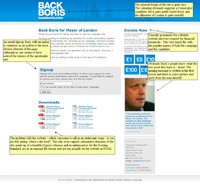OK, so I'm going to be nowhere near as good at this as the past masters at the Biving's Report, but I thought it would be quite good fun anyway. The Conservatives are running a slightly unusual contest - for the UK, at least - to decide who is going to the their candidate for Mayor of London. They are holding an open primary, wherein, if they register with the party, any Londoner is eligible to vote. There are four candidates seeking the nomination: Andrew Boff, Victoria Borwick, Warwick Lightfoot and, of course, Boris Johnson. It struck me, a few weeks after they all declared their candidacy, to have a look at their websites and see what I thought. In such a contest, there really is only one person you can start with - Boris. I have captured an image of his site below, which I have annotated. You can click on the thumbnail to get an enlarged view.
Boris is noted for being pretty web-savy and, almost uniquely amongst British political figures, his blog gets thousands of hits and hundred of comments. For that reason I am pretty under whelmed by his efforts. The page has a nice colour scheme and doesn't feel overcrowded - which is a good thing - but there is nothing there! Actually, that's not quite true. There are prominently displayed volunteer and donate options, which is obviously good, especially given that Boris is a populist politician and the London Mayoral contest is probably the single most populist contest going. But the site has no features at all. There is no video or YouTube stream, no link to the Boris for Mayor facebook group (which has nearly 5000 members), no blog (or even a link to his regular blog), or podcasts. The whole thing looks like it was knocked together in half an hour - to the extent that there is even a typo in the candidate's name (note to Boris Johnson's staffer - the correct way to use an ownership apostrophe on a singular ending in s is to add 's i.e. Boris's, not Boris').
In fact, I very much get the impression that this is placeholder page. This indicates a couple of interesting things. Firstly, if you look at American examples, candidates who announce their candidacy for high office will tend to have an all-singing, all-dancing website ready to go, so that when they announce their intention to run, it is just a case of flicking a switch to create an instant web-presense. Maybe the lack of a better site indicates that Boris's decision to run really was as sudden as the media portrayed it, and not a cleverly planned political masterstroke. And secondly, and quite depressingly, the state of this site possibly indicates the Internet is still deeply undervalued in British politics. After all, even if Boris Johnson did only decide to run suddenly, it is more than a month since he announced that he was standing. On paper Boris, a politician who is popular because of who he is, and not because of his party affiliation or his beliefs, would seem absolutely perfect for a web-driven campaign. Furthermore, the open primary model adopted by the Conservatives would seem to suit this kind of campaigning. It is really very strange that more effort has not been made.
I shall be back with more on the other candidates in the near future.
OK... it suddenly occurred to me that readers outside the UK might not be that familiar with Boris Johnson, and as a result, the post above might only make limited sense. Let's just say Boris is a phenomenon - a genuine political superstar. He is probably the single most popular British politician of any party, despite the electoral disasters that have befallen his party in the past decade. Some argue he is a lovable buffoon, whilst other claim his eccentric character hides a keen intellect. However, he has never been immune from controversy, having had affairs whilst married and managing to insult the entire city of Liverpool. But his reputation seems to thrive on it. His Wikipedia entry gives a decent biography and this homemade YouTube mashup demonstrates the kind of politician Boris Johnson is, but also why people really like him.
I also have to include my absolute favourite Boris clip. It occurred when he was asked to play in a charity football match. Boris entered into the spirit of it with his usual gusto (in case you aren't familiar with how he looks, he's the one with the very big, blonde hair).

